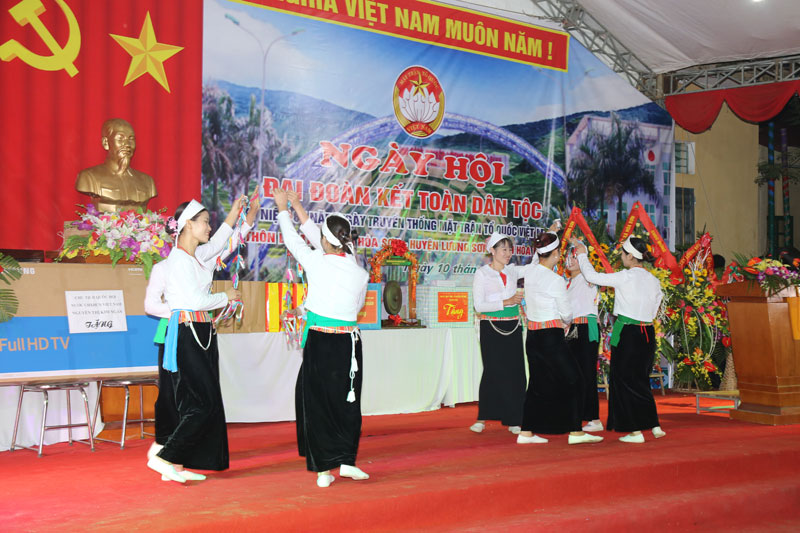
(HBO) With a total of 141 households, 699 people, the income of 77% households are mainly from raising stocks and planting, but up to now, the average income of people in Bui Tram village (Hoa Son commune, Luong Son) reached 30 million VND/ person/ year, the proportion of poor households declined to 2,1% according to new criteria.
The people in Bui Tram village, Hoa Son commune ( Luong Son) actively respond to the cultural and artistic movements to create a joyful and healthy life.
According to the assessment and classification in 2017, 90% households in the village met the cultural standard requirements and Bui Tram village has been continuously maintaining the title of Cultural Residence Area in 3 years (2015 – 2017). To get that achievement, in recent years, the Party, authorities and people in Bui Tram village have promoted the solidarity tradition, strengthened the movement of developing economy together and have had a lot of realistic activities to respond the campaign "All people unite to build a new and urban civilization”
The Head of Bui Tram village, Ms. Bui Thi Dung said: Thanks to the effective application of advanced scientific and technological achievements, new plants into farming, in the past years, the rice productivity in the village has reached at the average of 55 quintals/ hectare. Especially, since the movement of eliminating the mixed gardens, many households have developed the VAC models with high effectiveness like Mr. Quach Van Tham’s, Mr. Hoang Cong Nhat’s ones with the income from 300 -500 million VND/ year. These models are being expanded step by step. Besides, the trading business activities have got some good development such as Mr. Do Xuan Nhat’s family specializes in construction materials; Mr. Dinh Van Tuan and Quach Van Thanh’s families have high income from general business, etc.
Along with economy development, the Party, authority, organizations and agencies in Bui Tram village actively propagated, mobilized the people to implement well the Party’s guidelines and policies, the State’s policies and laws, the local regulations; to implement cultural lifestyle, civilized behaviors, to eliminate the obsolete customs, superstition, to preserve and promote the ethnic cultural identities, to actively participate in cultural, artistic, sports and physical training activities.
The Head of Women’s Union in Bui Tram village, Ms. Bui Thi Huyen said: The movements and activities of culture, art, sports and physical training have attracted many members, youth members and people to participate. This contributed to preserving and promoting the ethnic cultural identities in the residence. The residents are united to keep their lifestyles, fine customs and habits, and implement the civilized lifestyles in weddings and funerals. Over the past years, there has been no superstitious propaganda, superstitious practices, no third- childbirth and no case of child marriage. All the conflicts have been resolved right after arising; therefore, there are no overlapped complaint letters, crime or social evils.
Together with strengthening the movement of "All the people unite to build cultural lifestyle in the residence”, the learning promotion, talent promotion, building a community society have been actively participated by people of Bui Tram village. Since then, 100% of children at the learning age are able to attend schools; the percentage of graduates at all levels and the passing rate at colleges and universities has risen sharply compared to 2016. Participating in protecting environment, building clean and green landscapes are the activities that Bui Tram people actively join in. Up to now, 99% of the households have sanitary facilities, 100% of the households have access to clean water. All the manufacturing and trading firms obey the process of waste treatment. Public constructions, the village cemetery area have been completed according to the plan of building new rural area.
With an increasingly vibrant and widespread emulation movement aimed at building cultured residential areas and cultured families, Yen Thuy District has been making steady progress toward improving both the material and spiritual well-being of its people, while fostering a civilized, prosperous, beautiful, and progressive community.
Once lacking recreational spaces and community facilities, Residential Group 2 in Quynh Lam Ward (Hoa Binh City) has recently received attention for the construction of a new, spacious, and fully equipped cultural house. The project followed the model of state support combined with public contributions in both labor and funding.
The "All people unite to build cultural life" movement, which has been effectively integrated with Kim Boi district’s socio-economic development goals, is fostering a lively spirit of emulation across local residential areas, hamlets, villages, public agencies, and enterprises. In addition, through the initiative, traditional cultural values are being preserved and promoted, while community solidarity and mutual support in poverty reduction and economic development are being strengthened.
A working delegation of the Hoa Binh provincial People’s Committee led by its Permanent Vice Chairman Nguyen Van Toan on June 11 inspected the progress of a project to build the Mo Muong Cultural Heritage Conservation Space linked to tourism services in Hop Phong commune, Cao Phong district.
Born and growing in the heroic land of Muong Dong, Dinh Thi Kieu Dung, a resident in Bo town of Kim Boi district, in her childhood was nurtured by the sweet lullabies of her grandmother and mother. These melodies deeply imprinted on her soul, becoming an inseparable part of her love for her ethnic group's culture. For over 20 years, this love for her hometown has driven Dung to research, collect, and pass down the cultural values of the Muong people to future generations.
In the final days of May, the Ethnic Art Troupe of Hoa Binh Province organized performances to serve the people in remote, mountainous, and particularly disadvantaged areas within the province. These were not just ordinary artistic shows, but they were the meaningful journeys aimed at spreading cultural values, enhancing the spiritual life of the people and contributing to the preservation of ethnic minority cultural identities.



